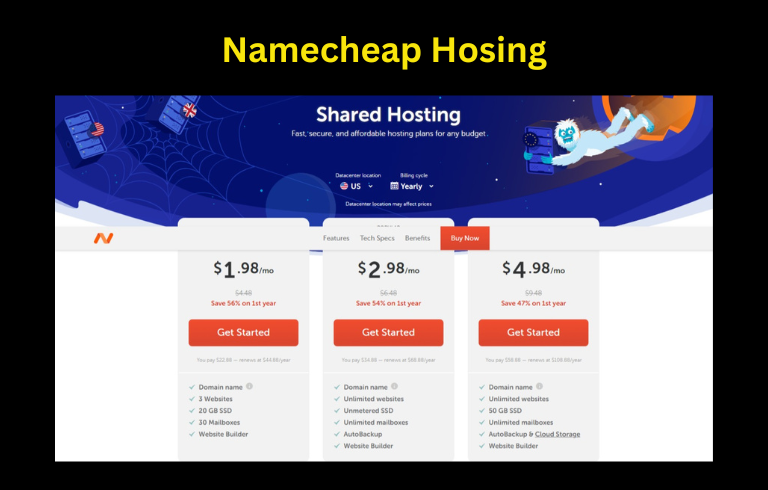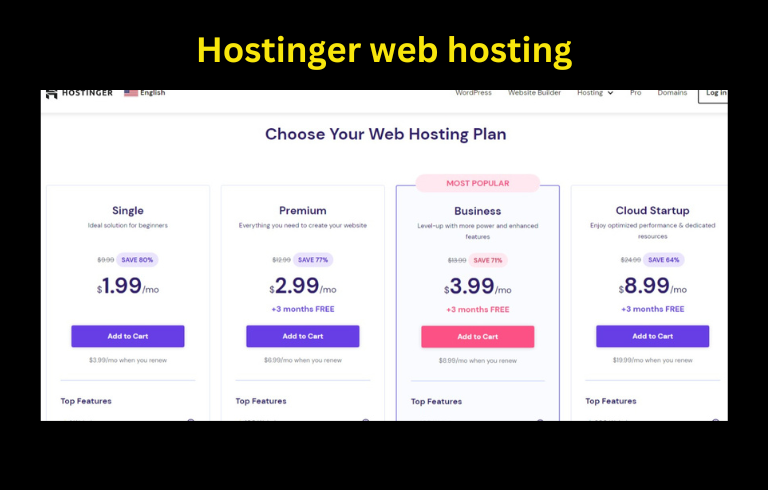Are you facing a dilemma when it comes to choosing between Hostinger vs Namecheap for your web hosting needs in 2024? The world of web hosting is teeming with options, and selecting the right one can be a daunting task. We understand the importance of fast and reliable web hosting in today’s digital landscape. The good news is that you’re on the right path!
Both Hostinger and Namecheap are reputable, dependable hosting platforms, but which one should you opt for?
Table of Contents
Hostinger vs Namecheap – An Introduction
Hostinger and Namecheap are two prominent players in the hosting industry, and for good reason.
Hostinger is a powerhouse in web hosting known for its affordability and exceptional performance. It offers lightning-fast loading speeds, robust security features, and a user-friendly interface, making it an attractive choice for businesses aiming to establish a strong online presence effortlessly.
Namecheap, as the name suggests, also prioritizes affordability and simplicity in its feature-rich hosting plans. It specializes in domain registration and management services, boasting remarkable RAM and bandwidth capabilities.
Key Differences Between Hostinger vs Namecheap
Both hosting platforms offer a range of plans and tools, including support for WordPress, email, and website builders. Here, we’ll delve into the key similarities and differences between Hostinger and Namecheap.

Hostinger vs Namecheap Web Hosting
Both platforms provide a 30-day money-back guarantee and offer the following hosting types:
- Shared hosting.
- WordPress hosting.
- Email hosting.
- VPS hosting.
In addition to these, Hostinger offers cloud VPS hosting plans, while Namecheap provides dedicated reseller hosting.
Let’s consider pricing for shared hosting plans. For Namecheap’s basic shared hosting plan on an annual basis, the cost is $1.98 for the first year and $4.48 monthly thereafter. On the other hand, Hostinger’s basic shared hosting plan, when signed up for annually, is priced at $2.29 for the first year and $5.99 per month subsequently. However, if you commit to a 48-month term with Hostinger, the monthly cost drops to just $1.99, making it a more budget-friendly option in the long run.
If you’re interested in WordPress or VPS hosting, Hostinger’s 48-month term also proves to be a more economical choice than Namecheap. Keep in mind that the best deals may require a longer-term commitment.
the winner is Hostinger (for offering the most cost-effective plans overall)
Hostinger vs Namecheap – Tools
When it comes to web hosting tools and features, both Hostinger vs Namecheap have some similarities, such as website builders, email accounts, and easy one-click WordPress installations. However, there are notable distinctions.
For instance, all Hostinger plans come with a free forever SSL certificate, while Namecheap provides it for free only during the first year. Bandwidth is another differentiating factor, with Hostinger limiting it to 100GB on its cheapest shared hosting plan, whereas Namecheap offers unmetered bandwidth across all plans. Both platforms offer free website migrations and automated backups, and the user-friendliness of Hostinger’s in-house hPanel tool is comparable to Namecheap’s cPanel for straightforward account management.
In terms of storage, Hostinger’s shared hosting plan offers more space initially (20GB on the basic plan compared to Namecheap’s 10GB). However, Namecheap’s unlimited storage option makes it an attractive choice for many users. When it comes to performance, although Namecheap’s response time, uptime, and site load times are above average, it falls slightly short of Hostinger’s performance.
the winner is Namecheap (for its storage and bandwidth capabilities)

Hostinger vs Namecheap – WordPress
Both Hostinger vs Namecheap offer dedicated and reliable WordPress hosting plans. Here’s a breakdown of their features.
Hostinger provides an optimized WordPress hosting solution tailored for WordPress websites, ensuring fast loading speeds and top-notch performance. Key features include support for 100 websites, basic WooCommerce functionality, 100GB of storage, one-click installation, weekly backups, easy migration, and unlimited bandwidth on the basic plan.
Namecheap also offers WordPress hosting plans optimized for WordPress websites, featuring support for one website, 10GB of storage, easy backups, installation, and migration, automatic updates, and 24/7 support. One notable difference is that all Hostinger WordPress plans include a free CDN, whereas Namecheap offers this feature only on its top two paid plans.
In summary, both hosting services are suitable for WordPress, but Namecheap is the better choice for beginners.
the winner is Hostinger
Hostinger vs Namecheap – Email
Both Hostinger vs Namecheap offer email services, but they have different offerings.
Hostinger partners with Titan, an email service provider, offering two dynamic plans with features like read receipts, email templates, undo-send, auto-reply, email aliases, and more. They also provide a free migration tool to transfer contacts and emails from other providers.
Namecheap, on the other hand, offers three email services: Business Email, Migrate Email, and Anti-spam protection. Their Business Email plans come with anti-spam protection, tighter app security, free forwarding addresses, two-factor authentication, and more. They also offer ‘Jellyfish,’ a new anti-spam protection service that efficiently deals with email threats and spam.
If you prefer an in-house email solution, Namecheap’s options may be more suitable.
The winner is Namecheap
Hostinger vs Namecheap – Website Builders
Both Hostinger vs Namecheap offer user-friendly website builders, but there are distinctions in their offerings.
Namecheap’s website builder, Site Maker, is basic but effective. It allows you to customize your website to a certain extent with a drag-and-drop builder, website templates, and simple analytic tools for managing website performance. You can also create your logo and business cards within Site Maker.
Hostinger’s AI-powered website builder, Zyro, is the clear winner in this category. It provides over 100 dynamic templates, easy eCommerce integrations, customizable design options, and a user-friendly drag-and-drop interface, making website creation quick and hassle-free.
the winner is Hostinger (Zyro)
Who are they best for?
In conclusion, both Hostinger vs Namecheap have their strengths and are suitable for different users.
Hostinger is an excellent choice if you’re looking for an affordable, fast, and reliable cloud-based, VPS, or shared hosting platform. Its intuitive AI website builder, Zyro, is also a compelling feature.
On the other hand, Namecheap is ideal for web developers, freelancers, and businesses in need of domain registration services and affordable hosting plans. Their reseller hosting plan is well-suited for personal websites and growing businesses.
To sum it up, the choice between Hostinger vs Namecheap ultimately depends on your specific needs and preferences. Consider your hosting requirements, budget, and the features that matter most to you. Both platforms offer a 30-day money-back guarantee, so you can explore them risk-free.
So, why wait? Make an informed decision and take your online presence to the next level!
